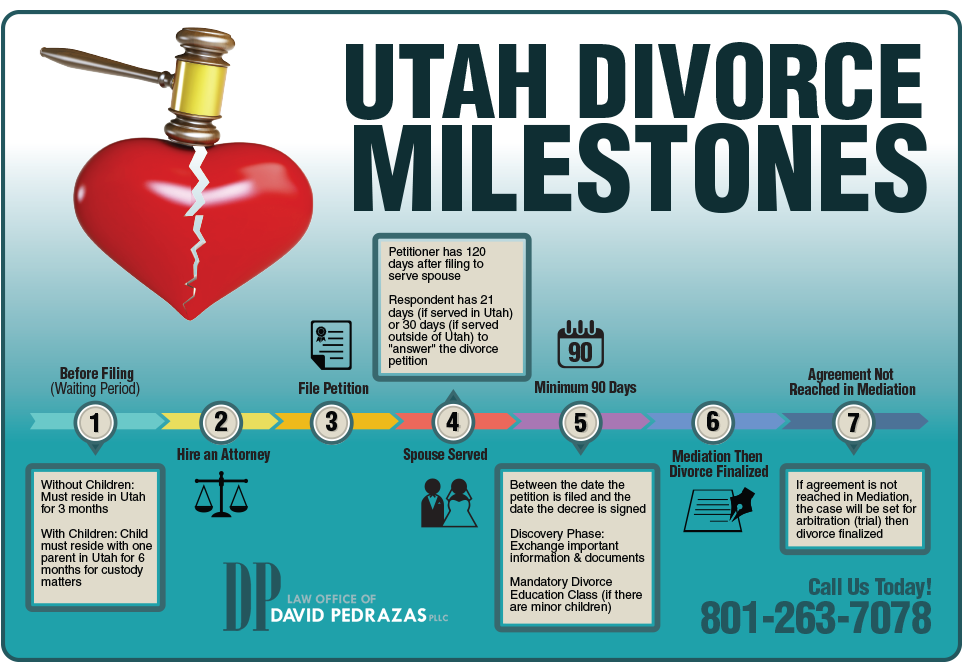How long does it take to get a divorce in Utah? Short answer: The timeline for a Utah divorce depends entirely on your situation. If you and your spouse can reach agreements on all the points of the divorce, then there are only some procedures to complete for the court. Then, you’ll have only a brief required Utah divorce waiting period after you file the petition to become legally divorced. But, if there are unresolved child custody, asset division, domestic violence, or other serious issues, your divorce can naturally be expected to take longer. So, how long will it take to get either an uncontested or contested divorce?
In the most general of terms, how long a divorce will take and each aspect of it will be determined by how willing both of the parties are to cooperate with the proceedings. If you are in the process of getting a divorce or are considering it, it is worth your time to look into what are the laws and regulations. While the process of a divorce is similar in many states, sometimes the tiniest details can make the largest difference.
Timeframes for Uncontested and Contested Divorces
There are two general directions a divorce can go, either uncontested or contested. If both parties are ready to divorce and can agree on all the terms, then a faster, more amicable, less financially costly divorce is possible. But, when a couple cannot agree on child custody, property divisions, or there is some other major area of conflict in a divorce, then the court must step in to decide such issues. That takes longer.
Uncontested Divorce
If you and your spouse agree on all the points of the divorce, then there are just a few legal procedures that must be completed in order for the judge to finalize your divorce. Following those essential steps, you’ll have only to wait through the Utah mandatory 30-day waiting period after you have filed the petition and associated documents. Then, you’ll be legally divorced. The average divorce timeline for an uncontested divorce in Utah is around 3 months or so and the process can be completed without costing too much time and money.

Contested Divorce
When an uncontested divorce is not an option because the spouses cannot agree on issues, the case becomes a contested divorce. When there is serious conflict about child custody, asset divisions, domestic violence, or other major issues, getting divorced in Utah can be expected to take longer. A case may require mediation or even a court trial. Ultimately, the parties either reach a settlement or the trial concludes with a final judgment from the court. The whole process can take 9 months or even longer in more complex cases, for example, those involving hidden assets, domestic violence, or other serious complications.
Waiting Period?
In the state of Utah, the laws do not require you to be a resident for a very long time at all. In the case of a dissolution of marriage with no children involved, you must have lived in only a single county in Utah for the 90 day period before the divorce petition is filed, as per Utah Code Section 30 – 3 – 1. If there is a child involved then the minor(s) must have lived with one of the parents in Utah for the 6 month period preceding the filing. However, there are some exceptions to this.
Also, according to Utah law, there must be a period of 90 days between the date of the petition being filed and the date that the final decree is signed. Parties may petition the court to waive this waiting period if there are extenuating circumstances.
Timeframe for Filing for Divorce
To begin the process of divorce in Utah, here’s what you’ll need to do:
Gather Your Documentation
Gather the necessary documents for the court. If possible, you should come to agreements with your spouse on the main issues. Those might include child custody, who will reside in the house during the divorce process, temporary spousal support, and the major debt and asset divisions. This preparatory process can take between a week to several months, depending on how motivated you are to get these steps done and move forward.
Get a Divorce Attorney
Obtain an experienced Utah divorce lawyer to ensure that all your legal rights are fully protected through the process. Serious oversights and/or other errors in the divorce petition, accompanying documents, hearings, or general divorce case management can derail the process in the Utah court system. Your lawyer prevents the risk of your divorce case being prolonged, or even dismissed, by ensuring that no details are missed and that all laws and court rules are obeyed.
File the Divorce Petition
After you file your Petition for Divorce with the court, the judge will review your documents and provide a response within just a few days and schedule a hearing date.
Make the Decision
The first thing that you need to do when getting a divorce is to find a good attorney. Once you have made the decision regarding your representation, you will receive a document regarding fees and retainers that will describe the hourly rates as well as other billing information in detail.
File Petition with the Court
Utah is known as a mixed state. What this means is if the parties do not wish to show fault then they do not need to by using what is called a no-fault divorce. However, if one of the parties wishes to show fault, that is also possible.
Other Party is Served
Within 120 days of the petition being filed, the respondent will be served. The respondent then has a set time frame to file their answer. This is:
- 20 days if the respondent lives in Utah or
- 30 days if respondent is not a resident of Utah
If no answer is filed then the respondent will be in default.
The Court Will Process Your Divorce Petition.
An uncontested divorce process in Utah is simpler, so it’s faster. If both spouses cooperate and reach all the necessary compromises without delay, a divorce decree can be issued fairly quickly. The judge will review all the documentation you and the respondent have submitted. If the agreement is fair and equitable and legally compliant, the divorce is finalized immediately after the mandatory 30-day waiting period ends. But, if mediation and ultimately a court trial become necessary to decide difficult issues between the parties, the divorce process will take longer, in some cases well over a year.
Temporary Orders Made for Pre-Trial Motions
After the petition has been filed and the respondent served, there will be temporary orders made by the court. These can include:
- Child custody
- Child support
- Visitation
- Alimony
- Restraining orders and more
Discovery Phase, Exchange Documents, and Information
During this phase, information and documents will be exchanged. This can include information or documents regarding alimony, child support, income, property, assets, and more.
Divorce Education Class
If the divorce includes minor children then divorce education class is mandatory for both parties.
Mediation
If both parties are agreeable to the dissolution of the marriage, division of assets, child support, custody, alimony and everything else involved then the judge will sign off on the divorce with no need for arbitration.
Arbitration
If there is no agreement reached in the mediation then the case will go to court. Attorneys for each party will present their arguments along with any evidence and then the judge will make a decision regarding any unresolved issues. This can include child custody, visitation, child support, spousal support, and even the division of property.
Divorce Finalized
Once the Decree of Divorce has been entered by the court, the divorce is finished, although neither party is free to remarry for a period of at least 30 days.
If you are thinking about getting a divorce or even if you want to know what your options are, don’t hesitate. Contact David Pedrazas for a Legal Case Review today and get a more comprehensive explanation of our Utah divorce timeline.
Best Divorce Help – Law Office of David Pedrazas, PLLC
For more than 20 years, Attorney David Pedrazas has helped people get the best possible outcomes of their Utah divorce cases and move on as quickly as possible to better years.
For the best help with divorce issues, call the Law Office of David Pedrazas, PLLC, or contact us here on the website to discuss your situation.
Other Related Articles:

